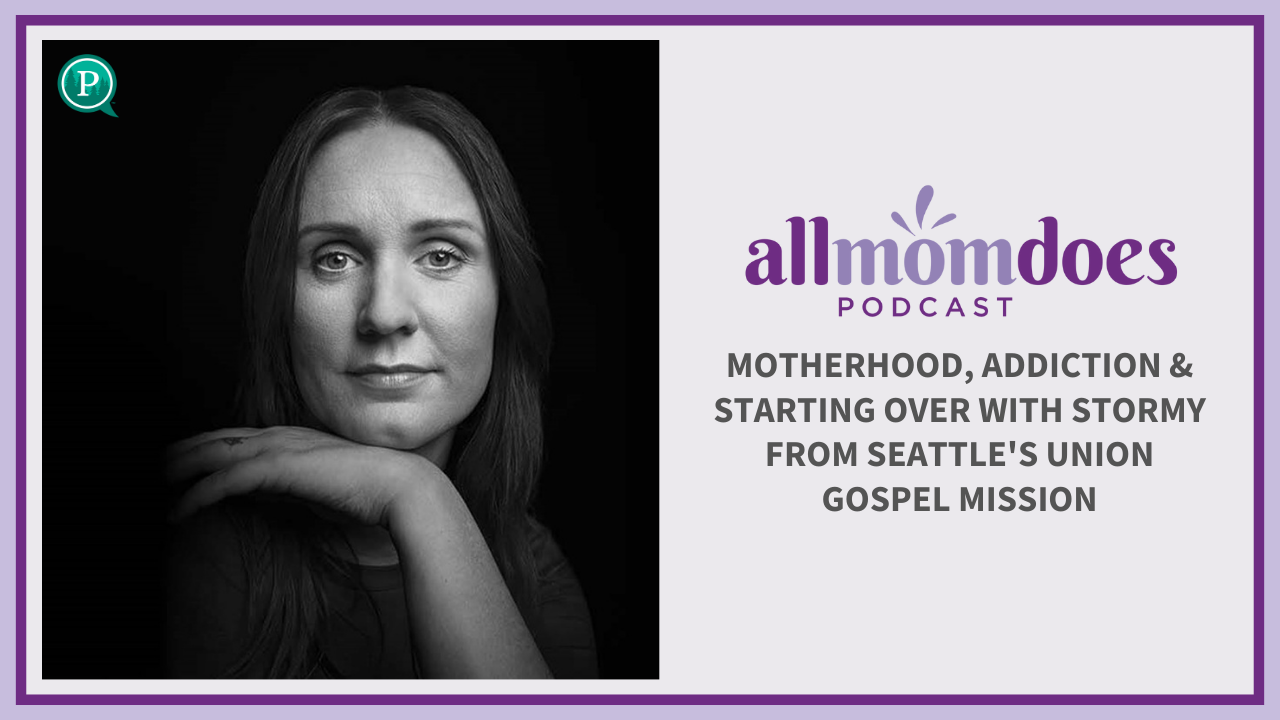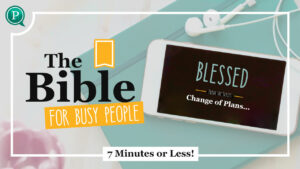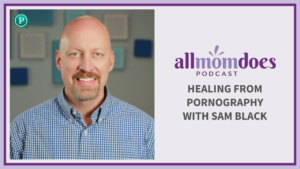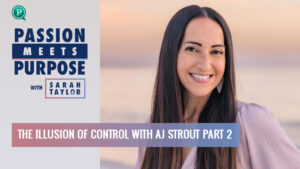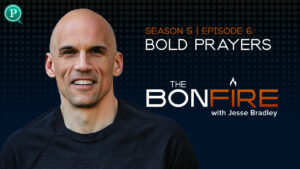Disclaimer: This story contains sensitive content that may not be safe for young ears. Consider putting in earbuds if you have kids present.
In this powerful conversation about motherhood, addiction and starting over, Stormy of Seattle’s Union Gospel Mission shares her story of loss, hopelessness, and redemption with AllMomDoes host Julie Lyles Carr. It’s a conversation you don’t want to miss.
Special thanks to Seattle’s Union Gospel Mission, for powering the AllMomDoes Podcast this Christmas season!
Show Notes:
Find Seattle’s Union Gospel Mission: Online | Instagram | Facebook | X
Find Julie: Online | Instagram | Facebook | X | Pinterest
AllMomDoes | Instagram | Facebook | X
Transcription:
Julie Lyles Carr:
For today’s episode, a quick programming note. I’m going to be discussing with my guest, her process to a very challenging season in her life and part of that journey is going to include some discussions on substance use and some other domestic issues. And so I just want to take this opportunity that you might want to put in those earbuds and just take a moment to reset a little bit. This is a conversation that is so important, but also might be a little much for some little ears, so get in those earphones and then I’ll join you on the other side.
I’m your host, Julie Lyles Carr, and I have a new friend that I’m going to introduce you to you. A lot of times when we’re running the mom lane, we can tend to, I don’t know, maybe surround ourselves with people whose stories look a lot like ours, or we seek out people who seem familiar to us, or sometimes we avoid people who seem to be in circumstances that can be hard for us to imagine, and yet sometimes we find ourselves in circumstances that we could not have imagined as moms. I’m excited for you to meet my friend, Stormy. Stormy, thank you so much for being with me today.
Stormy:
Thank you for having me.
Julie Lyles Carr:
Stormy, a lot of the moms that we’ll have on here, or a lot of the moms who listen, they will talk about their stories from a perspective of, well, I met this guy in college and we fell in love, and then I worked for a while, we got married and then after a little while, we had our first baby and we bought our first house. Those are great stories and those are things that we hope for people in terms of blessings. But Stormy, there are a lot of women out there, a lot of moms that that is not how their story begins. Take me back and tell me about what your childhood and your upbringing were like, where you grew up and what some of the things that you struggled with were when you were young, when you were in those growing stages.
Stormy:
Well, when I was a kid, my mother was a single mom. It was me and my sister and my mom. My mom was actually a drug addict and an alcoholic and also she dealt drugs out of our home, and so I sort of just grew up around a lot of chaos and there was domestic violence in the house. There wasn’t a lot of feeling of safety, and as a child, I remember thinking I just wanted my life to be normal. I just wanted a normal life. When I got older I said I was never going to be like my mom. My dream in life was to get married and have a baby and raise kids differently than how my mom raises us. I wanted to raise kids in a good environment and be a good mom.
In my teen years, I started experimenting with drugs. I think as much as I didn’t want to be like my mom when I grew up, I started experimenting with drugs anyways and by the time I was 18 years old, I knew I was already a drug addict and an alcoholic and I didn’t feel a lot of hope for my life. I didn’t really think that I was capable of having this better life. The people that I saw, I used to go to church with my aunt and uncle and I would see the nice families with parents that were together, like the mom and the dad, and they had a good home for their kids, a safe place. I didn’t think I was capable of having that kind of life. I did get married when I was 20. My husband and I were both alcoholics and addicts and we started having kids and from the beginning, it was off to a bad start.
Julie Lyles Carr:
You end up not wanting to, but kind of repeating a pattern because you had this with your mom, the situation, then you end up marrying someone who’s struggling with the very same things. Do you think in some ways, you tended toward that because that was what was familiar, that was sort of what you knew as you were coming into these adult years and everything becomes a little bit scary and unknown when you’re launching out on your own and yet you kind of return to some of the same stuff? Do you think it was because it felt familiar?
Stormy:
Yeah, definitely. I mean, growing up, I didn’t have a lot of good influences in my life. I didn’t have a lot of people in my life that were not drug addicts and alcoholics, so it was definitely familiar. I do think that I gravitated towards what I knew. That was the only lifestyle that I knew, chaos and violence and drug addiction.
Julie Lyles Carr:
That’s the case for a lot of us, even if it isn’t drugs or violence or those kinds of things, that we do tend to replicate that which we’ve been raised in, and that can be for good and that can also be for difficulty. We can replicate some of the same patterns we saw in our parents’ marriages. We can replicate some of the same patterns that we saw in their work lives or lack thereof. It just all kind of comes around, and certainly within parenting. Now after you married, you started a family and the thing that you had said you for sure didn’t want to do, which was to raise kids in the same kind of conditions, ended up being what happened, so catch me up there when you started having children and you didn’t yet have a grip on sobriety, on walking away from some of these issues, and now you have this moment where you realize that your kids are in the same circumstance you were in. When did all that kind of hit you and begin to really make you go, “Oh, boy.”
Stormy:
It was a slippery slope. I thought I had control of my life at the beginning and considering the conditions that I was raised in. For a long time, I was like, “I’m doing better than mom. I’m doing better than my mom.” But it really was a progressive just downfall to just like this miserable existence where I was exactly the thing that I didn’t want to be. I remember when I was addicted because I was addicted to heroin, I remember my house was just a mess and my kids needed me to care for them. They were toddlers at the time, and I remember I just couldn’t manage to get up to do anything because I was withdrawing from drugs. I just remember feeling like I need help, but I didn’t know how to access that help. I didn’t know how.
Julie Lyles Carr:
Right, and I think that’s the case for a lot of people that I have talked with who I think sometimes there can be sort of a self-righteous assumption that, well, if somebody really wanted to change, they would. Or if somebody really wanted help, they would get it. But it’s not that simple. Is it, Stormy? I mean, for a lot of people, they don’t know where to turn. You were in a pattern where you hadn’t witnessed someone who’d been able to make that turn, and now you’re at a place where you recognize that things are getting really dire and yet what do you do? Who do you turn to? Who do you go to? In that moment, you didn’t know where to reach out for help, and ultimately, you lost custody of your kids. What happened when that occurred? What were the circumstances around that?
Stormy:
This is kind of hard for me to talk about.
Julie Lyles Carr:
Of course. Yeah.
Stormy:
I left my marriage with my husband. We were just fighting all the time at home and I remember thinking, again, I was like, I don’t want to raise my kids around fighting all the time and anger and violence, but I didn’t know the proper steps to remedy that situation, so I just left and I went and lived with my parents and he went and lived with his parents and my parents still did not have a safe home, and his parents had a little bit more stable of a home, so my kids went and lived with their dad. Then that’s when I kind of spiraled downward because I didn’t have my kids.
Julie Lyles Carr:
Right.
Stormy:
I ended up getting pregnant again and I was with a man who was psychologically and verbally abusive to me, but we did drugs together and again, it was familiar. But when I was pregnant, I couldn’t stop using drugs as much as I wanted to and as much as I always judged other women, when I heard of women using drugs when they were pregnant. I still I wanted so badly to quit, but I was using against my will. Every day, I would wake up and I would say I didn’t want to do it. Then by the end of the day, I was using again.
When my baby was born in the hospital, I had very little prenatal count and they drug tested the baby and the baby was positive for methamphetamines, and so there was a CPS case opened and they took the baby from me in the hospital, and my other kids who were actually when I was pregnant, they had come and lived with me for a little while in the unstable house with the psychologically abusive man, but their dad’s mother had passed away, so he didn’t have a very stable place for them either, so they were staying with me, but CPS came and took them from me, and they also took the baby and I was just devastated. I don’t know what I thought was going to happen when the baby was born, but going into the hospital to have my baby and then coming out without my baby, I was just devastated.
Julie Lyles Carr:
Yeah, yeah.
Stormy:
I knew I had to make a change if I wanted to ever get my kids back, and I knew that God had another plan for my life, so I left the man that was abusive and I went. I didn’t have anywhere to go, but I went and stayed at some of the shelters in downtown Seattle and for a while, I was just kind of wandering the streets of Seattle in a daze, not really knowing where to turn.
Julie Lyles Carr:
Then, in a way that I think is so amazing, you encountered Seattle’s Union Gospel Mission. I have to say, Stormy, seeing you on camera, you in no way look like someone who has been through all the things you’ve been through. If I were to encounter you in a grocery store, I would never know, and I think this is one of the things that’s so important for listeners to know. We never know someone’s story. It’s so easy to judge when we hear circumstances, when we hear things that have gone down, when as moms we might say, just like you were saying, you yourself were like, “I don’t understand women who use when they’re pregnant,” and then you find yourself doing the very same thing. When we can suspend judgment and say how do we help people? How do we come alongside people? How do we stop a cycle of blame and judgment and really come alongside and help resource people, help them lift their eyes again, help them find hope? Tell me about the moment that your path intersected with the Seattle Union Gospel Mission.
Stormy:
How it happened really was when I was out on the streets and I didn’t really know where to turn, I remember that I had the court case in downtown Seattle at the courthouse, so I’m like, maybe I’ll just go down there and see if there’s still a chance that I can get my kids back, because it had been a little while and I wasn’t sure if I missed any court dates or not, but I didn’t really, it was just a really unstable time in life.
I rode the bus down to the courthouse and then I went in and I spoke with somebody down there who she had been where I had been, she’d lost custody of her kids, she was a peer support specialist, and she told me that she’d been through what I’d been through and she’d gotten her kids back and she had this career and she had a home for her kids and stability. Just hearing that it was possible, that somebody else had gone through it and had gotten on the other side really gave me hope.
I got into the Family Treatment Court program and the Family Treatment Court team recommended treatment. When I was in treatment, I was close to graduating and everybody on my team, including myself, thought that it wasn’t smart for me to go out back to… I didn’t really have anywhere to go anyways, and they recommended the recovery program at Seattle’s Union Gospel Mission so that I could get more stability and have accountability and just prove to the team, the Family Treatment Court team that I was capable of having my kids back, and so I was still in the process of getting them back.
I started calling the Women’s Recovery Program to try to get an intake, and before I graduated, they were able to set up a bed for me at Hope Place in the Women’s Recovery Program. I went straight from treatment to the Women’s Recovery Program at Hope Place, and I just remember walking in through those doors and it was just like beautiful. The building was so amazing, and the people at the front desk were just so kind and welcoming and it just felt really safe. I think for the first time in my life, I felt safe.
Julie Lyles Carr:
That brings up such an important point, Stormy, because I think for anyone who’s going through an incredible level of trauma and trying to walk into recovery, that place of feeling that you’re going to be safe, that you are going to be able to tell your story, you’re going to be able to get the help that you need, but that you’re going to be safe for a period of time. That is such an important message to any of us who want to help others, who want to care for others. And yet, sometimes we start from a place of trying to figure out what caused this or trying to break down all these different things or put some kind of restrictions or whatever in place. And instead, what a beautiful thing that what you noticed first was that you felt safe. That’s just absolutely incredible. As you entered their program, what were some of the first things that you began to realize? As you started walking through what their recovery process looked like, what kind of hit you first?
Stormy:
The idea of like God helping me through this. I couldn’t do it on my own. I knew I couldn’t do it on my own. I tried for years, but really the God aspect, because when I was, I didn’t really go into this part, but when I was with my abusive ex-boyfriend, I remembered some of the things that I learned when I was in Sunday school when I went as a kid and stuff with my aunt and uncle, and I remembered like if I turn my life over to God, then no matter what happens from here, everything’s going to be okay, so in that moment, I did, and God just came into my life and in my situation, and I had so much peace, and that was what really enabled me to get out of that situation, so after that, I was discovering my faith in God. I felt like he rescued me.
When I found out it was a faith-based program because I didn’t know that going in there, it was just like I was willing to do whatever I had to do. When I found out it was a faith-based program, I really felt like that was where I needed to be and that was where God wanted me to be. The classes that you take at Hope Place really dig into the root causes of why we get to the point where we’re at, like why we start using drugs, why we become homeless. It’s not just scratching the surface. It’s a program that helps you really build a foundation for a good recovery, a good solid recovery, and I think a lot of it has to do with the faith component.
Julie Lyles Carr:
Right, right. Stormy, how long did it take? Because I know that none of these things can be prescribed broadly, right? Everyone has their own path. Everyone has their own journey. You yourself said that for years, you’d tried, you’d fought, you’d failed, you’d tried again, all the things. At what point, once you began their program, did you start to feel like, I might just be able to get a handle on this? There might actually be a light at the end of the tunnel?
Stormy:
I would say it was definitely in the first year because I went through the year recovery program, but not until like later in the year, so it took a while to really feel that there was a light at the end of the tunnel. I had so much wreckage that I had caused in my addiction. I had dug myself into a hole financially. I didn’t have my license because I had gotten three DUIs and I had a large amount of child support debt, and I had medical debt from when I was in a drug-induced psychosis when I was on the streets, and so I checked myself into multiple hospitals in the Seattle area. It just felt really overwhelming for a long time, and it felt really like an impossible situation to get out of, an impossible hole to dig myself out of.
But the Mission also has a legal department that they help you work through a lot of those kinds of things, so I was able to utilize their legal department to deal with the medical debt and get charity care. I was able to get help filling out applications for charity care for the medical debt that I owed, and we ended up getting community service for some of the financial debt that I owed to the courts and stuff like that and my child support. I was able to get that forgiven even by the Board of Child Support or something like that. But anyways, so as time went on and I started working on these things, little by little one step at a time, it really helped me to gain my confidence back that I could do it, but it wasn’t immediate. It wasn’t right away. It really took time.
Julie Lyles Carr:
You bring up such an important point because so often we think about someone coming out of an addiction cycle and we only think about the addiction. We don’t think about the entire structure that’s now been built around what has happened. That is a really important distinction, Story, I hadn’t thought about that in that way, that getting over the addiction to alcohol or drugs is one thing, but then there is the place of needing to come alongside and fix what all has been wrecked in the midst of that addiction cycle. That’s a really important distinction.
Now, as this recovery began to take place, and at about a year mark, you began to go, okay, maybe there’s some light at the end of the tunnel. I think what’s so incredible is what you shared with me when we first got on together, before we got on the mic. Tell the listener what you’re doing today. This is absolutely amazing.
Stormy:
After I graduated the year-long recovery program, I joined the graduate internship program and there was an internship open in the marketing department. Through that internship, I learned some graphic design skills, marketing skills, and really just learned how to work again in an office environment. My team, the other members of the marketing team at the Mission, they just really came alongside me and they accepted me and they took me under their wing and they taught me so much and after my internship was over, they asked if I would stay on as a contractor, so I was contracting for a few years, and then just about a year and a half ago, they hired me on full time.
Julie Lyles Carr:
That’s just incredible, that the very place that you’ve been working toward your own recovery, you’re now able to help in ways others who are walking the same process. That’s just absolutely amazing. Statistically, I know, Stormy, that we’ve got listeners that they may not have the same challenge you had. They may have a different challenge with a different type of addiction. They may be right in the same place that you are, trying to hide it from people, trying to do different by their kids and yet feeling like they’re failing, wanting to make a difference, wanting to make a change, not knowing how to do that. What is something that you can leave with that listener today that you now know looking back? What is something you can tell them to encourage them, to give them some hope?
Stormy:
I guess I would say that it can be done, but you really need to come to a point of surrender. For a long time, I tried to hold on to all these ideas of what, I tried to hold onto control. I wanted to keep this, and I just had to let go of any ideas of what I thought my life would look like and just give it to God. I had to become willing to do whatever it takes to find recovery and sobriety and sobriety, because as long as I have my recovery, everything else will fall into place. But without my recovery, I don’t have. If I were to go out and use drugs tomorrow, like I don’t know, I know for a fact that would lead me to losing everything again, and so I don’t know if that really answers the question-
Julie Lyles Carr:
Oh, it absolutely does. It absolutely does. That wisdom of coming to a place where you recognize that part of the addiction cycle, even though everything feels really out of control, is actually it has a lot to do with you wanting to be the one controlling everything to have both worlds. Wow, what an insight, Stormy. That’s absolutely incredible.
Well, I can’t thank you enough for being on today and sharing your story. We’re going to have Rebecca put in the show notes because I want listeners to know about this resource that’s in the Seattle area, Seattle’s Union Gospel Mission, and there are other organizations. I’m in Texas, and so there are other organizations that will come alongside in a faith-based way. It’s so important for us to know that those kind of efforts, including one like Seattle’s Union Gospel Mission, really can change lives and bring things around, so Stormy, thank you so much for your transparency.
Stormy:
Can I just say one more thing?
Julie Lyles Carr:
Of course.
Stormy:
On December 30th, I will have eight years clean and sober, and one of my proudest accomplishments is that I get to provide a safe place for my kids to live, that I have my own place and I have a job, and my kids don’t have to come home and worry about what’s going to happen when they get home. Are they going to be safe? Is somebody going to be fighting? I get to provide a safe and healthy environment for them.
Julie Lyles Carr:
That is massive. What an incredible, incredible moment. I’m just so thrilled for you, friend, and hey, I’m going to keep that December 30th date in mind. I’m going to be celebrating you from here. That’s absolutely amazing. Stormy-
Stormy:
Thank you so much.
Julie Lyles Carr:
… thanks again so much for being on.
Stormy:
Thank you.
Julie Lyles Carr:
And listen, I want you to go to the show notes because you know what? You and I both know that there are all kinds of addiction cycles, recovery that needs to be had for all of us. We all have things that we are struggling to let God take control over, that we’re struggling to surrender to, so I want you to check out the show notes. Rebecca’s going to have a lot of resources for us there. You can learn more about this particular Mission and what they do and the way that they help lead others to recovery.
Be sure and go to AllMomDoes wherever you get your podcasts. Leave a five-star rating and review and be sure and grab the link. Share this with someone who you know needs to hear this message, who needs to know that there is hope on the other side of addiction. I love to interact with you too. I’m Julie Lyles Carr, all the places, mainly over at Instagram. Check me out there and I’ll see you next time on the AllMomDoes Podcast.

